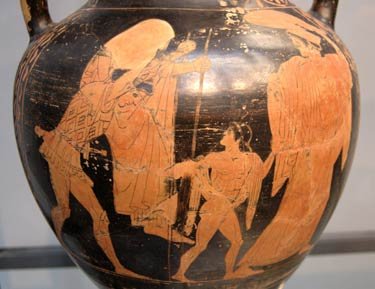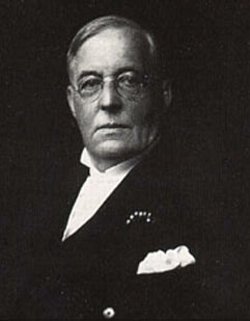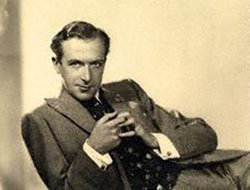
Aeneas carries Anchises, with Ascanius and his wife. Amphora from a Greek workshop in Etruria around 470 BC, Deutsche Staatliche Antikensammlungen
I cannot resist sharing the absolutely delightful descriptions of the eccentricity and profound learning of “Dr. Meleager” from Shane Leslie‘s 1926 portrait of undergraduate life at King’s College, Cambridge The Cantab.
“Dr. Meleager” constitutes an admiring portrait of the great Æschylean scholar Walter George Headlam (1866-1908), who was also depicted as William Rodney in Virginia Woolf’s Night and Day (1919) and as William Banks in Virginia Woolf’s To the Lighthouse (1927).
————————–
The charming variety of the College lecturers enabled Edward to dispense with lectures outside. It was the pride of King’s that outsiders trooped into her lecture-rooms, while only Kingsmen who had an hour to kill in the mornings went to the vaunted lecturers of Trinity. Edward made trial of Dr. Verum, who had achieved fame by the exchange of vituperative pamphlets on the editing of Æschylus with Dr. Meleager of King’s ; and the fastidious editor of Sophocles, Sir Dominick Webbe, whose Greek accents, however, were always corrected in the University Press, to the admiration of Europe. There was also Webbe’s bitter rival in literature and politics, Dr. Henry Johnson. Between Webbe and Johnson lay the bitter gulfs betwixt poet and philosopher, Tory and Whig, dandy and Bohemian, while alas ! there was only one Regius Chair of Greek to contain them both. As this was occupied by Webbe, it was obvious that until Webbe had himself been translated, Johnson could not be happy. King’s was indifferent to the Greek Chair, knowing that in the eyes of Germany Cambridge scholarship was blazoned with the name of Dr. Meleager.
Dr. Meleager was always buried in books. Select parties of disciples were accustomed to excavate him and extract his wisdom. Edward attached himself to one of these parties, armed with note-books and copies of Æschylus. Dr. Meleager’s name was found at the foot of the stairs in Bodley’s, leading to rooms with a jutting oriel window. The rooms did not appear to have been tidied since the Deluge. Noah’s folio library lay in strata on the floor, flanked and piled with opened Greek texts minutely annotated in ink. Wacklein’s interleaved Æschylus crossed the occupant’s knees, every word of Greek submerged under references, while exquisitely tricked emendations filled every corner of unprinted space. A rich surface manure of unopened bills, brown-paper parcels, press cuttings on every subject that was Greek or remotely Greek, including Greek Church and Modern Greek politics, had settled on the furniture. The floor was deep with scribbled paper, exercises that had been shown up and lost years previously, and, oddly enough, copies of the Sporting Times, whose pinkiness had faded with dust. Books lined the room, and the great Paris edition of the Stephanus Thesaurus threw a red splash on the wall. A door opened into a bedroom which served as library, while a third room seemed to be a huge wastepaper-basket.
It was a short time before Edward could separate the debris from their owner. Dr. Meleager had a pale drawn face, something between an early Christian ascetic and a tricky slow bowler. Youthful enthusiasm made the lip mobile, and behind gold-rimmed spectacles the blue, print-worn eyes twinkled like a pair of hawks mewed under glass but waiting to scour untracked plains of papyrus. Photographed fragments of MSS. on the table awaited discernment, containing perhaps some lost line of Euripides or new reading of the Agamemnon of Æschylus, to which Dr. Meleager had devoted his life. With assumed surprise Dr. Meleager asked the reason of the intrusion, as though he were anywhere except in a College of students or atmosphere of approaching examinations.
‘Please do not leave any exercises here, for they will assuredly be lost,’ observed Dr. Meleager, watching Edward’s swollen note-book. Edward explained that he had come to hear a lecture. This produced a shrill laugh. ‘Lecture? Why, I haven’t lectured for years. If you want Latin, I know no Latin. I always use cribs and advise you to do the same.’ ‘We have come for Greek, sir,’ some one suggested, whereat his eyes twinkled. ‘Greek? I am still learning Greek myself. When I think of the late authors I have not read, it is enough to keep one in till Christmas.’ With a clear half-bantering voice, playful of a little stammer, he continued to parry the searchers for knowledge with fanciful information.
‘I have been reading the Book of Wisdom, the most Pindaric in the Bible. I am rather busy now reading the newly discovered Herondas, whose writings I am informed are rather like those of the monosyllabic Gyp. I have the Dictionary-makers ahead and all the Grammarians and Rhetoricians, read by nobody except the Germans nowadays. It is terrible at my age to think that Maximus Tyrius is half-read. However, if you like, we can begin the Agamemnon. Steep yourself in Elizabethan before you translate Æschylus.’
Dr. Meleager divided the world into those who knew or knew not Greek. But he added by way of encouragement, ‘You know that my great purpose in life is to help those who love great poetry. I don’t mean the Professors and Examiners, but people who don’t pretend to know Greek and are ready to follow me out of the outer darkness of sciolists, where the gnashing of commendators is heard.’ And he laughed, pushing his little pump-shod feet on to a sofa.
Then he read the second Chorus of the Agamemnon as though it were something rich and rare, explaining the motifs which underlay the Greek, and how the changes in metre signified change in emotion and the arrival of different gods. ‘ Why, Apollo and Dionysius could be traced by the very pattern of the scansion ! Rather like the pattern on this dressing-gown!’ The groups of longs and shorts became notes of music under his suggestive wand, until, throwing himself on the piano, which supported a half-empty tankard of beer and a copy of Quain’s Medical Dictionary, he began to pick out, theme by theme, the long-lost music of Hellas. ‘Swinburne,’ he suddenly shouted, ‘is the only man living whose ear has lighted on secrets of Greek lyric which took me years of study. For instance: enter Heracles, and you get Dorian phrases marking heroism and self-control! Enter Dionysius, and hey! the Ionian Glyconic,’ and he tapped keys in illustration. ‘Then the Pæonic, most moving of metres —-say to yourselves —- Catherine of Aragon! -—Canterbury Pilgrim! Isn’t it simple?’
Dr. Meleager paused, and one of the party introduced a suggestion from Dr. Verum. This roused him. ‘There are three things the modern commentators do not understand in Greek: the effect of particles, the order of the words, and lastly the connection between underlying ideas in Greek poetry. They are always expecting the Greeks to share the modern vice of trying to be original, and complaining that they are copycats and plagiarists. The Greeks would disdain to use a new theme or new proverb in their literature. All their lyrics are subtle variations on the old.’
Dr. Meleager read a few lines of Æschylus. Suddenly he came upon an emendation with which he had replaced a gloss. With a shrug of his elegant shoulders he explained how glosses crept into texts, but that if you had studied the minds of the Alexandrine gloss-makers and dictionary-builders, you could guess the word the gloss had displaced. ‘It is no use saying the phrase seems strained and leaving it. Read half Greek literature till you find the missing word: that is what I do.’
And the amazing lecture continued, Dr. Meleager sometimes refreshing himself with the emptied tankard of ale or a walk among the books in the next room. ‘Remember that Æschylus builds dramas in the way Beethoven piles pillars of music. Don’t regard the text of Æschylus as antiquated cuneiforms. Interpret his Persian play with Burton’s Arabian Nights, and find the Flight into Egypt in the Suppliants. His Prometheus stealing the fire is the myth of Adam taking the apple, the forbidden property of the gods. And by the way, the order of emphasis in a Greek sentence is exactly the opposite to English. Nobody know that?’
Edward noted down this glowing material while Dr. Meleager returned to his piano. Enter Artemis and Apollo! Let Pæonic trumpets blow! The Pæonic metre I call the Poacher, because it is the same as that jolly tune, “As me and my companions were setting of a snare.” Do you remember? But these things only come with observation. Don’t rely on editor’s instinct. It was by astronomer-observation that Bentley detected the habits of Greek Anapaests and Porson noticed certain practices peculiar in Greek Iambics. Now go and let me read my Quain in peace. I am sorry to say I have developed several of the symptoms of Leucocythcemia, a rather rare disease from the East, but I always said Bodley’s was unhealthy. This part of the Backs should be dedicated to the Infernal Deities. I shall have to finish reading Shakespeare this term. It’s bound to be one of the subjects set.
‘But there are three things I want to see before I die: Tangier and Dan Leno and Pretty Polly. Greece the great desirable I have seen, that land of amethystine haze and twilight coffee. Oh, the icy Hades of the Cam!’ And he shivered a little and withdrew with Quain’s Dictionary into his bedroom. He did not reappear, and the party quietly decamped. Two hours had passed. . . . Dr. Meleager lived and worked as though death preluded a colossal examination wherein the reading of all men would be tested, a Tripos set by the Trinity. …
There was one great difference between Dr. Meleager and other Cambridge scholars. They went to the Germans for their texts and philosophies and philologies. But the Germans came to Dr. Meleager. He was immovable in King’s, seldom leaving his rooms unless to see a surreptitious cricket match at Lord’s or to wander down the Newmarket Road on the chance of seeing ‘Pretty Polly.’ Sometimes he went into the Fellows’ Gardens with a threatening axe, but whether to fell ornamental shrubs or to practise the stroke of Clytemnaestra in the bath-scene of the Agamemnon was not revealed. One evening Edward found him painting the carved stone inside his window-mullions with hectic dispersion of red paint. No doubt he was following some rediscovered cue in Greek Art. On his table was an open Bible, wherein he had marked cross-references between Scripture and Greek literature. ‘It’s all in Æschylus,’ murmured Dr. Meleager between brushfuls.’ Prometheus is the theme of the New Testament and the Oresteia is the Old; vengeance, horror, tribal destiny, insane pride against the gods, and final Nemesis. Remember that Christ was crucified in the Caucasus. You remember Prometheus with the eagle beside him.’ Edward’s thought flitted to the Rood in St. Giles’, and for a moment he guessed why St. John was personified as an eagle. Did everything in legend and religion fit? Was all the pagan counterfeit of the Christian? Dr. Meleager continued painting.’ The inside coating ought to be taken from nature like the under-red of a mushroom. No Cambridge upholsterer has ever understood colour, because they live in a cold, soupy Hades. But reds are important. Never use bright red except in the sun. Under the Cambridge sky reds must be the red of faded morocco or dead roses or spilled port. By the way, there will be no more lectures this term. The Regius Professor of Greek is mortal and I must prepare my Praelection for the Senate House.”
‘What subject are you taking, sir? ‘ asked Edward.
‘The second Chorus of the Agamemnon.’
‘Have you taken a long time?’
‘For ten years I have been preparing,’ said Dr. Meleager solemnly. ‘The fall of Agamemnon was worked out by Æschylus far more subtly than the fall of Adam by the theologians. His fall was parallel to that of Paris. From Ploutos or Prosperity he passed to Koros, which is Satiety, and landed him in Hybris or Insulting Pride. Elpis and Thrasos, Hope and Boldness, led him to Atee or Inspired Wilfulness, using Peitho or Persuasion as her agent provocateur. Take these, take the metres, build up a Beethoven sonata, and you have a chorus of Æschylus.’ …
Most of the party were weary Examiners or examinees and were content to lie in the thick dry sedge, King’s forgetting and by King’s forgot. It was a day not richly dight in experiences, but moulded to beautiful tones. Only when the launch turned slowly homeward did the ripple of to-morrow’s Greek ruffle Edward’s peace. Dr. Meleager sat absorbed in the sunset. The colourless moon interested him as the source and symbol of so much Greek poetry and Mediterranean religion. Edward had a curious feeling that he should not miss a last opportunity to pump Dr. Meleager’s wits, and broached shop. ‘There is a good deal of difference, sir, between the Cam in winter and summer, as much almost as there is between prose and poetry in Greek.’ ‘Without prose we should never realise poetry,’ answered Dr. Meleager. ‘The study of late prose helps me weed the glosses out of the great plays. You can read the Greek poets for ever. Simonides was Pheidias in verse, pure Parian. All the great poets were prototyped in Greek. Milton is Æschylus, Wordsworth is Callimachus, and Heine is the Spirit or Puck of the Greek Anthology. When a Greek poet was not imitating the musician, he was copying the painter. Ionic words patch oriental colouring into the Persians of Æschylus. His metaphors make the effects of impressionism almost like coloured transfers. You must read the whole of Greek not to miss one point in Æschylus. Grammars are only museums, collections of freaks. Lexicons are the dead burying the dead. But a scholar should keep his own lexicon as a gentleman keeps his own cellar. Liddell and Scott, however, is the most useful collection of errors ever published. I think I could make ten corrections on every page.’ And he looked upward with a shrug as though he expected nothing of Academies, and then, swerving his thought: ‘What’s your idea of an angel? Something like an Athanasian hospital nurse? I dreamt of one last night standing over me, something between a fairy and policeman. Anyhow, Angel is the loveliest Greek word in the English language.’









